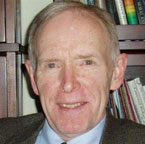 Robert J. Noone, Ph.D. has been a practicing psychotherapist for more than 40 years, is founding faculty of the Center for Family Consultation, and maintains a private practice in Evanston, IL. Dr. Noone is also a member of the faculty at The Bowen Center for the Study of the Family in Washington, DC, and is the editor of Family Systems: The Journal of Natural Systems Thinking in Psychiatry and the Sciences.
Robert J. Noone, Ph.D. has been a practicing psychotherapist for more than 40 years, is founding faculty of the Center for Family Consultation, and maintains a private practice in Evanston, IL. Dr. Noone is also a member of the faculty at The Bowen Center for the Study of the Family in Washington, DC, and is the editor of Family Systems: The Journal of Natural Systems Thinking in Psychiatry and the Sciences.
Dr. Noone was the executive director of the Family Service Center of Wilmette, Glenview, Northbrook, and Kenilworth, a mental health center with a professional staff of 22 serving the North Shore for 27 years. Prior to that position he was on the clinical staff of the Family Service and MHC of Oak Park/River Forest for 12 years, serving as the director of the alcohol and drug abuse program.
Dr. Noone is a nationally recognized presenter on Bowen theory and psychotherapy, and is the author of numerous published articles on the subject. He was the recipient of the Polly Caskie Research Award presented by the Georgetown Family Center for research related to the impact of stress and the family on the health of children. He received his Ph.D. at the University of Illinois Chicago and did his postgraduate training at the Georgetown University Family Center in Washington, D.C. His research interests have included: stress reactivity, the family emotional system, and the interplay between genes and the family during development and over the generations.
Contact Information
You may contact Robert J. Noone via email using the form below.
Robert J. Noone Publications
Noone, R.J. (2015). Multigenerational family emotional process as a source of individual differences in adaptiveness. In: The Family Emotional System, R.J. Noone & D.V. Papero (Eds.) pp. 29-41. Lanham, MD: Lexington Books.
Noone, R.J. & Papero, D.V. (2015). Toward a science of human behavior. In: The Family Emotional System, R.J. Noone & D.V. Papero (Eds.) pp. 3-14. Lanham, MD: Lexington Books.
Crews, D. & Noone, R.J. (2015). Early context-dependent epigenetic modifications and the shaping of brain and behavior. In: The Family Emotional System, R.J. Noone & D.V. Papero (Eds.) pp. 87-101. Lanham, MD: Lexington Books.
Noone, R.J. & Papero, D.V. (Eds.) (2015). The Family Emotional System: An Integrative Concept for Theory, Science, and Practice. Lanham, MD: Lexington Books.
Noone, R.J. (2014). Differentiation of self as a multigenerational process. In: Differentiation of Self, P. Titelman (Ed.) pp. 83-98. New York: Routledge.
Flinn, M.V., Ponzi, D., Nepomnaschy, P., & Noone, R. (2013). Ontogeny of stress reactivity in the human child: Phenotypic flexibility, trade-offs, and pathology. In: Adaptive and maladaptive aspects of developmental stress, G. Laviola and S. Macri (Eds.), Chapter 5, pp.95-120. New York: Springer Press.
Noone, R.J. (2013). Physiological mediators in family emotional process. Family Systems, 9(2) 156-158.
Noone, R. J. (2008). The multigenerational transmission process and the neurobiology of attachment and stress reactivity. Family Systems, 8(1) 21-34.
Flinn, M.V., Ward, C.V., & Noone, R.J. (2005). Hormones and the human family. In: Handbook of evolutionary psychology, D. Buss (Ed.), Chapter 19, pp. 552-580. New York: Wiley.
Flinn, M.V., Noone, R.J., & England, B.G. (2002). Longitudinal patterns of stress, family environment, and child health in a rural Caribbean village. Abstracts of the American Anthropological Association Meetings 2002, 145.
Flinn, M.V., Noone, R.J., & England, B.G. (2002). Longitudinal patterns of cortisol reactivity, father absence, and maternal behavior in a rural Caribbean village. Proceedings of the Human Behavior and Evolution Society 2002, 51.
Noone, R. J. (2001). The family as a source of nongenomic heritable variation. Family Systems, 6:47-66.
Noone, R. J. (1995). The family unit and the transmission of individual variation in adaptiveness. Family Systems 2:116-137.
—————- (1994). Intergenerational attachment and the family. Family Systems, 1:114-126.
—————- (1988). Symbiosis, the family, and natural systems. Family Process, 27:285-292.
—————- (1988). For the best view of your life, climb your family tree. An Interview with the Editors, U.S. Catholic 53:6-13.
—————- (1981). Observations on drug abuse and the family. The Family.
—————- (1981). Drug abuse behavior in relation to change in the family structure. Collected Papers: Pittsburgh Family Symposia, 1979-80.
Noone, R. J. & Reddig, R. (1976). Case studies in the family treatment of drug abuse. Family Process, 15:25-32.

